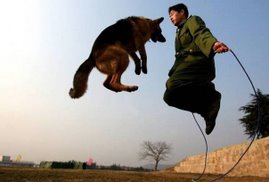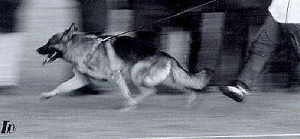By Christine Gajda
(originally published in USA magazine, May/June 2006)
Today the sport of Schutzhund is experiencing a rise in the number of so-called family dogs that are participating in the sport. Many of the dogs that we see at training are also housedogs that live with families with young children. The ideal Schutzhund dog has solid nerve and temperament, is not a menace to society, and is safe around people and children. With the constant threat of breed bans and common misconceptions about the sport, it is more important than ever to educate our children about appropriate behavior around dogs, and to insist that our canines are good citizens and examples of the breed. While many ideas are discussed below, most of them can be summed up in one word: supervision.
As the leader of your home, it is your job to ensure that everyone behaves appropriately. Dogs and kids LOVE mischief, and can make quite a formidable team digging up gardens, eating food between meals, redecorating the house with toys, and all sorts of other forbidden activities. It's nice to know you can safely "leave the dog and the kids in the backyard together", but don't be surprised when they have redesigned the landscaping. Also very important to remember is that dogs are by nature social climbers, and children in your absence may behave entirely differently than when you are around. Who will be the boss in your absence? Dogs should never be the leader, and young children cannot. Keep the situations where your children and dogs are together under control and predictable, not just in their actions together, but even more importantly in their interaction with each other. If you take a break from being the leader, someone WILL fill your spot.
Don't allow children to take advantage of a dog's tolerance. Children are small, make quick sudden moves, fall unexpectedly, and may on occasion do many things quite innocently that can be threatening to a dog. It is wonderful to see a dog with a solid temperament that does not react, however, just because a dog will tolerate any and all actions does not mean that he should be expected to on a daily basis. A teething toddler may innocently bite a dog's ear. Kids may fall on the dog, run and jump over him, step on tails, all without malice, but they should not be allowed to do so, simply because the dog will tolerate it. It is wonderful to realize that your dog is a saint, but this is nothing to brag about ("My dog will take anything my kids dish out…" is heard all too often) as it shows a serious lack of supervision and poor attitude of disrespect for the dog.
Children should be taught to treat others - INCLUDING animals - with respect. It is the parents' job to instruct and enforce appropriate and considerate behaviors. Conversely, do not allow a dog to take advantage of a child's small stature. This includes allowing the dog to take things, such as toys and food, from the child, and being allowed to run boisterously through the house knocking small children over. A dog that lives in the house must possess manners.
Pay attention to your dog's health. An ear infection or cut paw may make a dog less tolerant than normal. A dog with arthritis may have mood swings dependant on the weather. A female in season may react differently than normal because of hormonal changes. Children will not necessarily understand this, and paying attention to your dog's health will minimize the risk of any abnormal reaction to a child by the dog. If a dog that is normally appropriate around children begins showing strange behaviors, take time to analyze what has changed. Could there be a medical issue? Perhaps a trip to the vet is in order. Obviously the dog could simply be "pulling rank", but a dog that is physically uncomfortable or in pain will show it in how he reacts to what normally is not a problem.
People have children, and children have friends. Remember that not all children who visit your home are comfortable around dogs. Likewise, not all children who visit your home know appropriate behavior around dogs. Your presence will help make the visit positive for all. Your dog is your responsibility, and this can be a fantastic opportunity to educate others about appropriate behavior around dogs. If the visitors are unreceptive, don't allow your dog or children to be placed in an uncomfortable situation. Do not allow other people's children to inadvertently intimidate or harass your dog. Out of fairness to your dog, do not place him in a position that he is forced to react, and then will be labeled "mean" by the neighbor's kids. When in doubt, crate the dog!
Watch for warning signs that a dog may give that a child will not pick up on - a stiffened posture, direct stare, hackles up, teeth showing, or growl. Be aware of what prompted the reaction, and deal with it accordingly. Also watch for innocent gestures that a child may make, that a dog may see as threatening. Running top speed through the house in full Darth Vader costume waving a toy light saber may be great fun for your child, but could easily startle and threaten for a sleeping dog. Being aware of what your children and dogs are doing minimizes and risk for "misunderstandings". If your children are ready for some wild play, and the dog is sleeping, crate the dog! Everyone will be happier.
Teach your children to respect the training field. For the future of the sport and breed, it is imperative that children must be exposed to and involved with our sport. Schutzhund training days should be, whenever possible, a family affair. Club days, however, are a time that people come together to exchange ideas, proof their dogs, try new skills, and prepare for trials. While having children around can provide excellent distractions (one never knows when children will be present at a trial or show), children should not be permitted to interfere with what club members are attempting to do with their dogs. Loud, boisterous behavior can easily interfere with both a handler's and a dog's focus. Additionally, children need supervision to keep them a proper distance from the training field, especially when dogs are working off lead. Although many club members may be willing to help, parents that bring their children to training, trials and shows should be primarily responsible for their supervision - it should not become a group babysitting experience. Training, although enjoyable, is also serious and should be treated as such and respected. Supervising your children makes them welcome at all events.
On the opposite side of this, for those who do not have children at training, remember that the children of today are the dog owners, voters, and legislators of tomorrow. Keep your behavior towards fellow club members and their dogs respectful. Frustrations in training should not result in a barrage of swearing. If someone's children are distracting you, let them know and ask them to keep their children quiet. Nothing is gained by "dealing with it" and then complaining later to other club members. Having clear club rules about what is expected if children are present at training goes a long way toward preventing problems. Another issue important to all of us in the sport is cleaning up after your dog. This is an issue not only of common courtesy that should be standard with all dog owners, but of is of extra importance if there are small children around.
Involving your children in the dog's care is a wonderful way to teach responsibility to your children, and additionally helps the dog maintain a proper place in the pack. This being said, however, do not place sole responsibility for the dog's care in the child's hands. Children live with their parents for a reason: they are not able to care for themselves. One can logically infer that they are not able to care completely for another living being. Yes, they may be able to brush the dog on their own, or help with mealtimes, but the overall care of the dog must rest on the adult in the house. An adult must be responsible for recognizing when the dog needs to visit a vet, when a dog is eating too little or too much, or any of a myriad of subtle issues that can arise.
Even seemingly simple tasks such as brushing the dog or putting the food bowl on the ground should be supervised, to ensure that it is being done properly. (Note: a great way to have a child feed the dog is to have them ask for a "sitz" or "platz" before putting the food bowl on the ground - it reinforces their status in the pack, reinforces training, and also helps keep the dog from enthusiastically knocking the bowl out of the child's hands and spilling kibble all over. It must be supervised though, as the dog may not initially heed the child's command, and the child will most likely put the food on the ground anyway, thus rewarding ignoring a command!)
Just as we teach our children not to talk to strangers, we need to educate them on how to act around unfamiliar dogs, especially strays. Not all dogs are comfortable around children - quite frankly, not all dogs are comfortable around people. A dog that has been abused and hit may react negatively if a child reaches to pet its head. A dog that has had bad experiences with children may be wary or defensive with all children. Teach children not to run enthusiastically up to strange dogs. Teach children to always ASK FIRST before petting another person's dog.
Teach children what to do if a dog threatens them. Teach them that running and screaming can incite a chase - either in fun, or otherwise. Just as the one-in-a-million person may not have the best intentions toward a child, the same may apply to dogs. Not educating children for this possibility, however unlikely, is neglect. Children that grow up with a stable, well-mannered dog will often assume that all dogs are the same way.
Being a responsible parent and a responsible owner go hand in hand. Allowing either your children or your dogs to be unsupervised affects everyone, whether it is a neighbor that finds your dogs annoying, or the club member that dreads having your children around. What better example of the breed can be found than a dog that is strong on the protection field, yet still safe around children? And what better way to encourage the future of the sport than to welcome children with their parents at clubs? These are important, but as owners, parents, and club members, we all need to take responsibility that behaviors of everyone involved, in all situations - whether it be at home, training, or out in public - are supervised and managed to the benefit of everyone. REMEMBER: the children of today are the future dog owners, voters, and legislators of tomorrow.
Free coloring books about dog safety and care can be requested from Monster Dog Equipment, www.monsterdog.net
Read More...
Return to the Blog...












